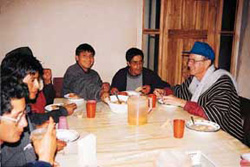What will Panchito do?
THE CHALLENGE OF SHEPHERDING YOUNG SEMINARIANS THROUGH THE PROCESS OF FORMATION
By Fr. Frank Hegel, S.F.M.
March 2002
Return to Table of Contents
Print Article
One of the toughest assignments I have had as a missionary priest has been as director of the diocesan seminary in Riobamba, Ecuador. It is really quite an awesome undertaking to assume the role of shepherding young men through their process of formation. Paul’s words to Timothy continually echo through my mind:
“Set the believers an example in speech and conduct, in love, in faith, and in purity. Pay close attention to yourself and to your teaching.” (1 Timothy 4:12,15)
How to set the example? That was always the burning question. How to make the practice consistent with the teaching? Definitely not an easy task, especially knowing all eyes were on you. The simplest things one does as a pastor, such as receiving people at the door, takes on extra meaning. Yet, I’m sure that despite all the formal classes in philosophy and theology, the things the seminarians were most likely to remember were the things they saw and heard as a result of some concrete experience.
Our location—just a block away from the parish church—and the seminarians’ involvement with the Christian communities in some of the more neglected neighborhoods, proved to be of immense benefit in this endeavor of setting an example.
In many ways the seminary became a parish in miniature. Theoretically this may sound like an excellent setup and indeed in many ways it was. But Paul’s exhortation to “set an example” made me feel like I was always in a fish bowl.
How do you receive someone at the door? How do you deal with the couple who comes seeking an emergency baptism for their child in the middle of theology class? How do you respond when a bereaved family unexpectedly arrives at the door asking for a mass of Christian burial because the pastor of the parish is unexpectedly absent? How do you react to the family who arrives at the door with a problem at the end of an already over-full 12-hour day? And what do you do about the community that arrives requesting a mass because the priest has not been able to make a visit there during the last two months?
What about the invalid woman two blocks away who wants to go to confession but cannot leave her bed? Or the young man who has attempted suicide and whose family has arrived for help? Or the family who wants their house blessed to free it of the spirits of a recently deceased relative?
These are the responsibilities of the parish priest one might say. Do you pass the buck on to him or do you opt to set an example using the demands of the moment? What would Jesus do? I ask myself. But while I ask that question, the seminarians ask, What will Panchito (that’s me) do?
Yes, it was a great challenge. But it held such great rewards as well. It forced me to constantly review and examine the commitment I had made as a missionary priest. It made me ever conscious of the privilege that comes when one is invited to enter into the intimate life of the other.
Return to Table of Contents
Print Article
